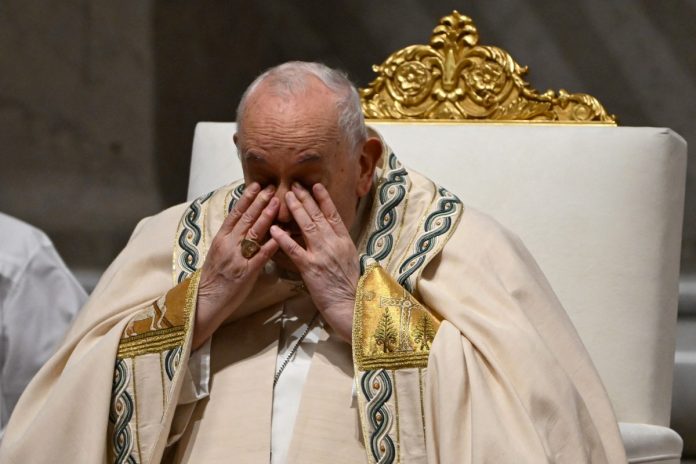In his first in-depth interview with a U.S. broadcast network, Pope Francis addressed a wide range of topics, including the war in Ukraine, antisemitism, and U.S. immigration policy.
A portion of the full interview, which will air Monday evening on CBS, aired Sunday evening on the network’s flagship magazine program, “60 Minutes.”
In the segment, the pope answered questions from “CBS Evening News” anchor Norah O’Donnell through a translator. CNA translated Pope Francis’ answers below from the original Spanish.
On the threat of famine in Gaza ahead of World Children’s Day:
“[The threat is] not just in Gaza. Think of Ukraine. Many kids from Ukraine come here. You know something? That those children don’t know how to smile? I’ll say something to them [mimics smile]… They have forgotten how to smile. And that is very painful.”
On wars in Ukraine and elsewhere:
“Please, warring countries, all of them, stop. Stop the war. Seek to negotiate. Strive for peace. A negotiated peace is always better than an endless war.”
On growing antisemitism in the U.S. amid the Israel-Hamas war:
“All ideology is bad. And antisemitism is an ideology, and it is bad. Any ‘anti’ is always bad. You can criticize one government or the other, the government of Israel, the Palestinian government. You can criticize all you want, but not ‘anti’ a people. Neither anti-Palestinian nor antisemitic. No. … I pray a lot for peace. And also suggest, ‘Please, stop. Negotiate.’”
On immigration:
“Migration is something that makes a country grow. [To O’Donnell:] They say that you Irish migrated and brought the whiskey, and that the Italians migrated and brought the mafia… [laugh] It’s a joke. Don’t take it badly. But, migrants sometimes suffer a lot. They suffer a lot.”
On Texas state effort to revoke registration of migrant-serving Annunciation House in El Paso, Texas:
“That is madness. Sheer madness. To close the border and leave them there, that is madness. The migrant has to be received. Then you see how you are going to deal with him. Maybe you have to send him back, I don’t know, but each case ought to be considered humanely.”
On the “globalization of indifference”:
“Do you want me to state it plainly? People wash their hands! There are so many Pontius Pilates on the loose out there… who see what is happening, the wars, the injustice, the crimes… ‘That’s OK, that’s OK’ and wash their hands. It’s indifference. That is what happens when the heart hardens… and becomes indifferent. Please, we have to get our hearts to feel again. We cannot remain indifferent in the face of such dramas of humanity. The globalization of indifference is a very ugly disease. Very ugly.”
On sexual abuse cases in the Church:
“[The Church] must continue working. Unfortunately, the tragedy of the abuses is enormous. And against this, an upright conscience and not only to not permit it but to put in place the conditions so that it does not happen. … It cannot be tolerated. When there is a case of a consecrated man or woman who abuses, the full force of the law falls upon them. In this there has been a great deal of progress.”
On the Vatican’s controversial Fiducia Supplicans document allowing for limited pastoral blessings of same-sex couples:
“What I allowed was not to bless the union. That cannot be done because that is not a sacrament. I cannot. The Lord made it that way. But to bless each person, yes. The blessing is for everyone. For everyone. To bless a homosexual-type union, however, goes against the law; the natural law, the law of the Church. But to bless each person, why not? The blessing is for all. Some people were scandalized by this. But why? For everyone! Everyone!”
When asked about criticisms from “conservative” bishops in the United States:
“You use the adjective ‘conservatives.’ That is to say, a conservative is one who sticks to something and does not want to see anything else. It is a suicidal attitude. Because one thing is to take tradition into account, to take into account situations from the past, but another is to be closed inside a dogmatic box.”
On gestational surrogacy, which is forbidden by the Catholic Church:
“In regard to surrogate motherhood, in the strictest technical sense of the term, no, it cannot happen. Sometimes surrogacy has become a business, and that is very bad. It is very bad. … The other hope is adoption. I would say that in each case the situation should be clearly considered, considered medically and then morally. I believe in these cases there is a general rule, but you have to go into each case in particular to assess the situation, as long as the moral principle is not skirted.”
On giving hope to others as the pope:
“You have to be open to everything. The Church is like that: Everyone, everyone, everyone. ‘That so-and-so is a sinner…?’ Me too, I am a sinner. Everyone! The Gospel is for everyone. If the Church places a customs officer at the door, that is no longer the church of Christ. Everyone.”
When asked what gives him hope:
“Everything. You see tragedies, but you also see so many beautiful things. You see heroic mothers, heroic men, men who have hopes and dreams, women who look to the future. That gives me a lot of hope. People want to live. People forge ahead. And people are fundamentally good. We are all fundamentally good. Yes, there are some rogues and sinners, but the heart is good.”









